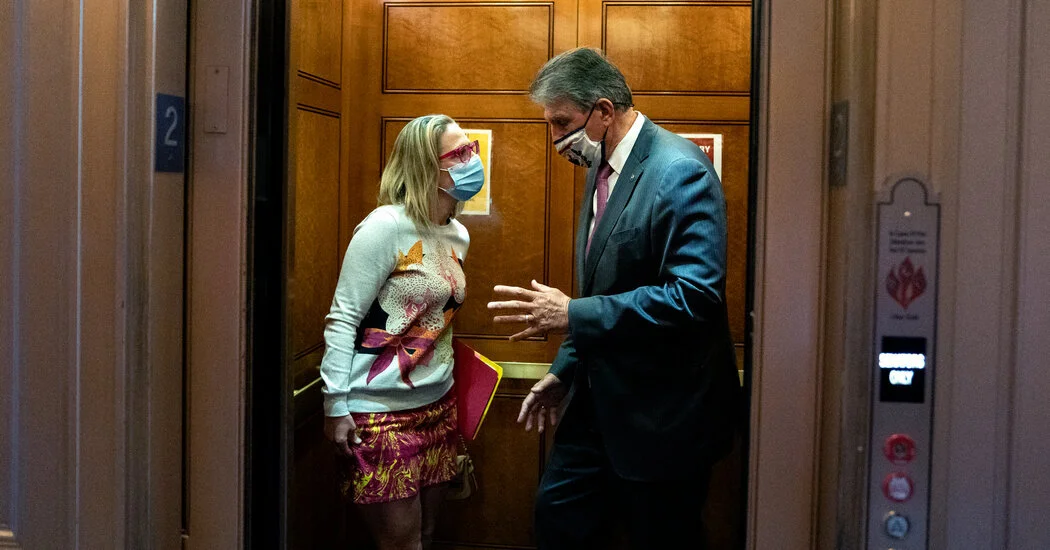OPINION: Politicians, you can’t always get what you want
Senator Joe Manchin, right, and Senator Kyrsten Sinema speaking at the Capitol in Washington D.C. in May of 2021. Photo by Stefani Reynolds of The New York Times.
Zach Richards is a junior studying history and an opinion writer for The New Political.
Please note that these views and opinions do not reflect those of The New Political.
President Joe Biden is currently attempting to pass two bills. The first, a bipartisan infrastructure bill, known as the Infrastructure Investment and Jobs Act, would provide a trillion dollars in funds to highways, transit, highway safety and transportation programs. The bill also plans to allocate $15 billion to replace lead pipes across the U.S.
The other is a reconciliation bill, widely known as the Build Back Better Act. Over the next 10 years, this bill plans to put 3.5 trillion dollars towards items such as two years of free community college, universal pre-K programs and expanded Medicare to cover dental costs.
There was a deal between Progressives and leaders within the Democratic party to pass those bills in tandem, but the Moderates backed out and the Progressives later followed suit.
The infrastructure bill passed the Senate with a vote of 69-30, but it still has to pass through the House of Representatives before Biden can sign it into law. We can assume most House Republicans will not vote for the bill, given that only 19 members of the Senate voted yes, and most of them just wanted to avoid the filibuster. Additionally, Democrats have a slim majority in the House, and there simply are not enough Progressives to stop its passage.
The Democrat’s plan is to pass the Build Back Better Act through reconciliation, a process that allows Congress to enact legislation with a majority of votes in the Senate (51 votes, or 50 if Vice President Kamala Harris breaks the tie). This would prevent a filibuster, which is ideal considering the Democrats would need 60 votes in that case.
This means the Democrats need all 50 of their senators to vote yes for the bill, given that every Republican opposes it. Two Democratic senators, Joe Manchin and Kyrsten Sinema, oppose the reconciliation bill and insist that certain items be cut out to reduce the price.
Many Progressives have thus decided that they should use the infrastructure bill as leverage. The argument goes that they will not sign onto the infrastructure bill that Manchin and Sinema support unless the two of them also sign onto the reconciliation bill.
However, the Progressives might not have as much leverage as they think. Their plan is built on the idea that Manchin and Sinema are eager for the House to pass the infrastructure bill, but there is a case to be made that the two of them are not as invested in this bill as the Progressives may believe.
Some Progressives have derisively referred to Manchin and Sinema as “the Do Nothing Caucus.” This comes from their continued support of the filibuster and their opposition to several legislations supported by most other Democrats including the PRO Act, the For the People Act and DC statehood. Since January, their actions have clearly demonstrated that they are content with legislation not being passed.
Between infrastructure and reconciliation, it seems likely that Manchin and Sinema would rather neither bill get passed than both. This frustrates Progressives, and understandably so. The infrastructure bill could considerably improve the lives of millions of Americans, so that money should be allocated as fast as possible.
However, whether or not they can sway Manchin or Sinema to vote on the reconciliation bill, Progressives should vote yes for the infrastructure bill simply on its merits for the American people.

